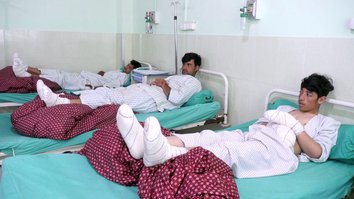HERAT -- Unemployment and poverty have risen to unprecedented levels across Afghanistan in recent weeks, with business activity coming to a complete halt in many areas.
Jobs have become increasingly scarce for those like day labourer Hussain Ali Hussaini, 58, who told Salaam Times he has not worked for a single day since mid August.
Every day, Hussaini said, he waits for hours by the side of the road, where other day labourers gather to be picked up for work but to no avail.
"Every day I wait for work with no luck, and I feel humiliated and frustrated," he said, noting that food prices have risen sharply. "How can I feed my family of nine and pay for their expenses if I have no job?"
![Labourers wait to find work September 4 in Herat city. [Emran/Salaam Times]](/cnmi_pf/images/2021/09/16/31698-w_2-585_329.jpg)
Labourers wait to find work September 4 in Herat city. [Emran/Salaam Times]
Before, labourers could typically find work for at least a few days in a week, said Ahmadullah, a day labourer in Herat.
"I used to work for four days a week... and it was enough for our living expenses," he said.
But now he finds it hard to find work even for one day a week.
The standard daily wage is 300 AFN ($3.50), Ahmadullah said, but these days if someone offers to pay him even 50 AFN ($0.60), he is willing to accept.
"Afghanistan's economic situation is worsening, and it is becoming so hard for the poor to earn a living," he said.
Unemployment has risen significantly in the past few weeks, and so has the price of food and petrol, said Mohammad Hassani, a worker in Herat city.
"I have not worked over the past three weeks," he said, adding that he had waited for a job at the corner of the road from dawn to dusk, without success.
Job opportunities wane
Hundreds of government and private sector employees have lost their jobs in the past month, with thousands of government workers prevented from returning to work in Herat.
And in less than a month, up to 3,000 private sector workers lost their jobs at Herat Industrial City, said Herat Chamber of Industries and Mines chairman Hamidullah Khadem.
Dozens of factories ceased their night-shift operations, he said, and "hundreds of night-shift workers were dismissed".
Production volume in Herat Industrial City has significantly decreased as the country's financial system falters, poverty grows and the marketplace contracts, he said.
Mohammad Nasir Azizi worked for five years at a food factory in Herat Industrial City, and now has lost his job.
"We wished for peace and prosperity with the end of conflict, but now that fighting is almost over, people will starve to death," Azizi said.
He has heard that factory has laid off nearly half its workforce because there is no demand in the local market and because the owner of the factory cannot make enough to sustain his business.
Looming catastrophe
In a September 1 statement, United Nations (UN) Secretary-General António Guterres said Afghanistan faces a looming humanitarian catastrophe. Almost half of Afghanistan's 38 million inhabitants need humanitarian assistance.
Eighteen million Afghans need immediate international assistance to survive, he said, noting that the country's residents are losing access to basic goods and services every day.
Going forward, providing employment opportunities and resolving social problems are the responsibility of the Taliban, said Faiz Mohammad Ahrary, a political activist in the Ghor provincial capital of Firoz Koh.
"If the Taliban do not normalise their relations with the world community and cannot ensure resumption of the international community's assistance to Afghans, the country will face a human catastrophe," he said.
Unemployment and poverty in Afghanistan have increased already, and this risk must be taken seriously, he said.
"The Taliban, as the current government of Afghanistan, are responsible for creating jobs and providing a peaceful life," said Herat city resident Wali Mohammad Siddiqi.
They must accept the demands of the international community and resume Afghanistan's relations with the rest of the world, he said.






